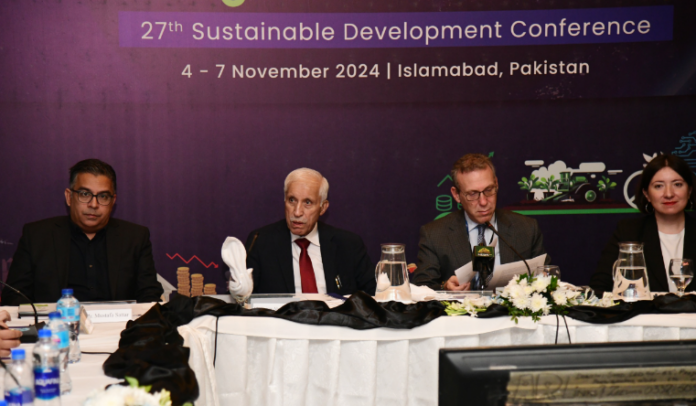ISLAMABAD: Qaiser Ahmed Shaikh, Federal Minister for Maritime Affairs, said more than 430,000 metric tons of used clothing arrived in Pakistan in FY2023-24 with the support of our port and shipping infrastructure.
Addressing a conference ‘National Policy Dialogue on Circularity and Used Textile Trade in Pakistan’ acknowledged the support of the Sustainable Development Policy Institute (SDPI), United Nations Environment Programme (UNEP), and the European Union (EU) for their collaboration in the Circularity and Used Textiles Trade Project.
The Minister emphasized the vital role of Pakistan’s maritime infrastructure in facilitating the import of second-hand textiles. He added that he recognizes that the efficient handling of these imports is essential for supporting local economies, job creation, and textile recycling efforts.
The Federal Minister further said that the ministry is focused on improving port efficiency and container management to streamline the processing of these goods, ensuring that shipments are processed in a timely and cost-effective manner.
The minister also outlined its ongoing efforts to develop waste sorting hubs for textile recycling, a key step in managing textile waste and reducing the environmental impact of global textile trade.
Additionally, he said that we are committed to implementing regulations that will limit pollutants from textile shipments, particularly harmful chemicals, to protect marine ecosystems and ensure sustainable shipping practices.
By introducing Extended Producer Responsibility (EPR) policies, the ministry aims to hold manufacturers accountable for the entire life-cycle of their products, encouraging responsible textile recycling and reuse.
Qaiser Ahmed Shaikh highlighted that as a part of its broader sustainability agenda, the ministry is also exploring green shipping alternatives, including the adoption of cleaner fuels and energy-efficient technologies to reduce carbon emissions from shipping operations.
These initiatives are aligned with international environmental standards set by the International Maritime Organization (IMO), ensuring that Pakistan’s maritime sector contributes to global efforts to combat climate change. He added that the Ministry’s commitment to these goals aligns with Pakistan’s broader sustainability objectives, reinforcing the country’s role in the circular economy and responsible textile trade.
Maritime Minister further said that the Ministry of Maritime Affairs continues to work closely with international partners such as UNEP and the EU to develop policies that promote circularity and enhance Pakistan’s role in the global textile trade.
These collaborations aim to address the challenges posed by textile waste, advance recycling efforts, and ensure that Pakistan’s ports and shipping operations remain efficient and environmentally responsible.
Through these initiatives, the Ministry seeks to make Pakistan a leader in sustainable maritime practices and contribute to the global goals of environmental sustainability and circular economic growth.




